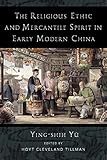The religious ethic and mercantile spirit in early modern China Ying-shih Yü ; translated by Yim-tze Kwong ; edited by Hoyt Cleveland Tillman
Material type: TextLanguage: English Original language: Chinese Publisher: New York Columbia University Press [2021]Description: 1 online resource (xlii, 281 pages)Content type:
TextLanguage: English Original language: Chinese Publisher: New York Columbia University Press [2021]Description: 1 online resource (xlii, 281 pages)Content type: - 0231553609
- 9780231553605
- Zhongguo jin shi zong jiao lun li yu shang ren jing shen. English
- 299.5/1156440903 23
- BL1803 .Y813 2021
- online - EBSCO
| Item type | Current library | Call number | URL | Status | Notes | Barcode | |
|---|---|---|---|---|---|---|---|
 eBook
eBook
|
Biblioteca "Angelicum" Pont. Univ. S.Tommaso d'Aquino Nuvola online | online - EBSCO (Browse shelf(Opens below)) | Online access | Not for loan (Accesso limitato) | Accesso per gli utenti autorizzati / Access for authorized users | (ebsco)2654641 |
880-03 Originally title: Zhongguo jin shi zong jiao lun li yu shang ren jing shen
Includes bibliographical references and index
"Argues that during the late Imperial period, all three main religious strains in China embraced an ethic that everyone should engage in labor as a crucial component to their personal enlightenment and their duty to society. This is what brings together new Chan (Zen in Japanese) Buddhism; new religious Daoism; and new Confucianism. All three new religions had to overcome traditional elitist biases and moral concerns about working for individual material results. To overcome traditional assumptions and practices, as well as to embrace the priority of working for one's livelihood, required the religious practitioners to resolve tensions within their own minds and often with precepts of earlier forms of their religious traditions. The final section of the book focuses on the changing social status of merchants, their enhanced self-confidence in their identity and profession, and their manifestation of the new work ethics in their mercantile activities, especially from 1500 to 1820"-- Provided by publisher
Editorial Note -- Editor's Introduction -- Author's Introduction -- Part I: The Inner-Worldly Reorientation of Chinese Religions -- 1. New Chan (Japanese pronunciation, Zen) Buddhism -- 2. New religious Daoism -- Part II: New Developments in the Confucian Ethic -- 3. The rise of new Confucianism and the influence of Chan Buddhism -- 4. Establishing the "world of heaven's principles": the "other world" of new Confucianism -- 5. "Seriousness pervading activity and tranquility": the spiritual temper of inner-worldly engagement
6. "Regarding the world as one's responsibility" : the inner-worldly asceticism of new Confucianism -- 7. Similarities and differences between Zhu Xi and Lu Xiangshan : the social significance of the division in new Confucianism -- Part III: The Spiritual Configuration of Chinese Merchants -- 8. Ming and Qing Confucians' view of "securing a livelihood" -- 9. A new theory of the four categories of people : changes in the relationship between scholars and merchants -- 10. Merchants and Confucian learning -- 11. The mercantile ethic -- 12. "The way of business" -- Conclusion.
Online resource; title from digital title page (viewed on March 23, 2021)


